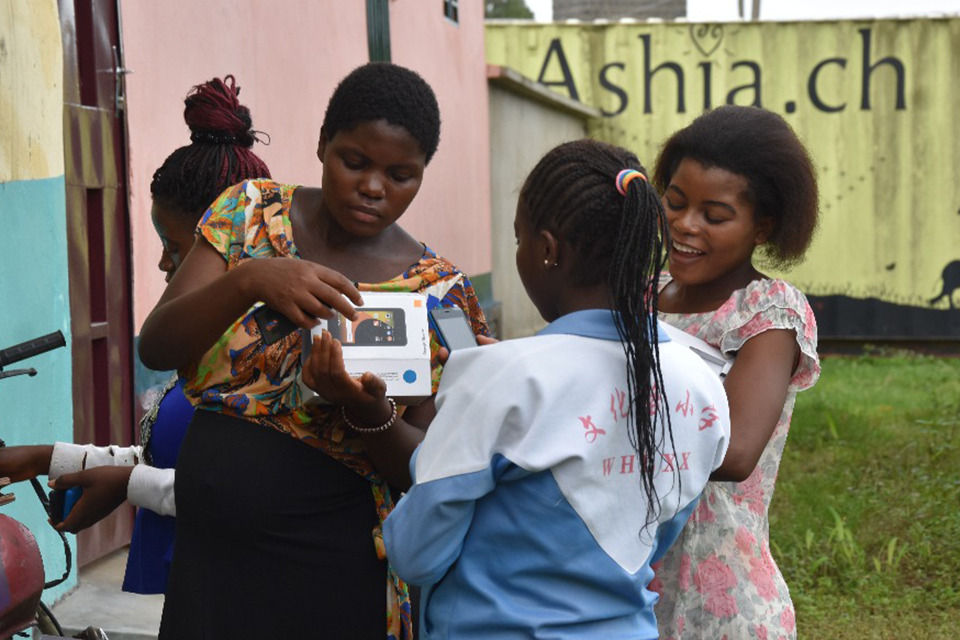Miriam Nkangu cut a hiking stick from the dense brush and set out on a 2-hour slog over muddy, uneven terrain in the Bali region of Cameroon.
“I was tracing the distance pregnant women have to trek to access motorable roads and transport services to the region’s health facilities,” she recounts.
Poor roads and difficult terrain, particularly in times of emergency, combined with a lack of quality prenatal health care services, have contributed to high rates of maternal mortality in sub-Saharan Africa.
Ms. Nkangu, a PhD candidate at the Faculty of Medicine’s School of Epidemiology and Public Health (SEPH), and her fellow researchers saw the potential of digital technology to reach deep into remote areas to help expectant mothers communicate directly with health providers, especially in urgent care situations, to access the support they need.
The result was the prenatal management system BornFyne (“safe delivery,” in regional dialect), a digital platform they designed to improve access to services among poor rural women in Cameroon and Africa at large, while enhancing care and supporting health systems and policies.
Reducing barriers to prenatal services
Piloted from 2018 to March 2020, the project delivered mobile phones with the BornFyne app to expectant mothers around Bali. Health care workers taught them how to use the app, registered them online, and helped them enter their health data; from there, mothers could carry out a continuous dialogue with their health care team throughout the pregnancy. The app’s GPS can also locate the mother in case of emergency.
Principal investigator Dr. Sanni Yaya’s team at the the Faculty of Social Sciences is supporting the qualitative research components of BornFyne and providing expertise into the social behavioural aspects.
“The ease of use overcomes the reluctance of some mothers to reach out for prenatal care due to the challenges of travelling, health care expenses, language or literacy barriers, or simple cultural mindset,” Dr. Yaya explains, adding that the app has a strong equity component of using graphics to communicate health and pregnancy status.
The Faculty of Medicine’s role, says Ms. Nkangu, lies in the support of quantitative design, implementation, and the generation of evidence and policy implications through SEPH.
“The collaboration between Faculties at uOttawa, as well as with other partners and the private sector, is bringing a diversified perspective and research expertise,” she says.
Connecting everyone for quality and continuity of care
The BornFyne app is connected to a web-based platform for health care providers. Ongoing communication between mother and provider enables a continuous monitoring of high-risk pregnancies and establishes continuity of care. The platform also captures the activities of all members of the health care team including sonographers, lab technicians and pharmacies.
It’s also real-time surveillance platform. “The app informs policy and helps optimize the quality of the district’s health services by tracking their ability to respond to health matters,” says Ms. Nkangu. “It also notifies the district of health patterns, enabling timely intervention by community teams.”
Further, the project funds solar power sources for mothers to charge their phones, and to light hospital rooms and allow reliable power for equipment and facilities storing medical supplies.
“Skilled birth delivery requires well-lit rooms,” says Ms. Nkangu, “and in saving expenses by purchasing larger quantities of perishable supplies, funds can be used for other resources.”
Overall, the team says, BornFyne has increased demand for access to prenatal care and skilled birth delivery in the Bali district. The pilot study data will be uploaded to the trial registry shortly.
Growing the successful platform
With uptake established across the Bali district in Cameroon, the BornFyne project is now in the validation and capacity-building stage as it spreads across other regions in Cameroon. The team is working with local stakeholders, policymakers and the telecommunications and health sectors, but has had to postpone travels due to COVID-19.
Meanwhile, the Geneva Health Forum has listed BornFyne as one of the top innovations in global health; the team will be showcasing the software at the Innovation fair in November. It has also been listed as a potential innovation to address COVID-19 by the Global Innovation Exchange.
“The entire Bali district and indeed all of northwest region of Cameroon is aware of BornFyne,” says Ms. Nkangu, “and it’s due to the impact it has already had on the lives of women, their families and the health district in the midst of an escalating armed conflict.”
BornFyne is funded by Grand Challenges Canada, an organization supporting innovations that improve the lives of the most vulnerable in Canada and low-and-middle-income countries.




